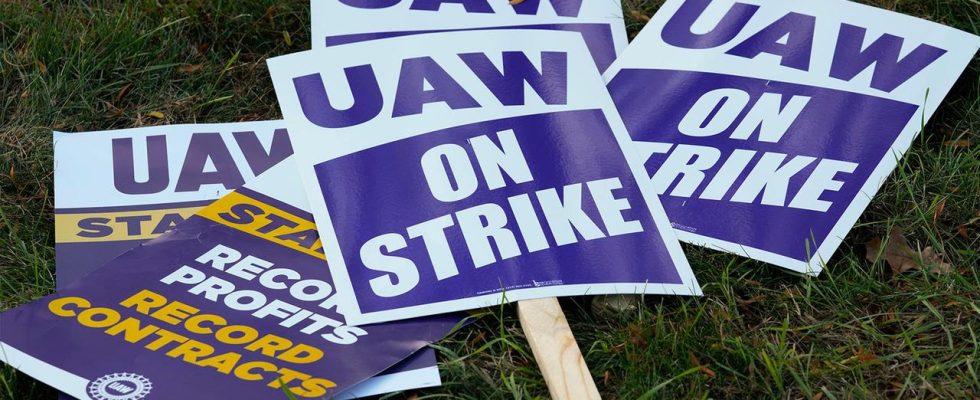The historic strike by the US auto union UAW against the three car giants in Detroit is over: After Ford and Stellantis, General Motors has now also agreed to significant wage increases.
The historic simultaneous strike against the “Detroit Three” – the three major US car manufacturers Ford, Stellantis and Generals Motors – is over. After 40 days of strike, GM, the last of the three auto giants, has agreed to a deal with the United Auto Workers (UAW) union.
GM is correct Record payments for employees
This tentative agreement is similar to the package the UAW previously negotiated with the other two auto companies. It provides record payments for employees: experienced workers in the highest group receive 33 percent more salary. As the Reuters news agency learned from two insiders, GM’s personnel costs will rise by seven billion dollars over a period of 4.5 years.
The union says workers should end their strike while the new contract is ratified. “We look forward to having all employees at all of our operations get back to work,” said GM CEO Mary Barra.
Originally demanded 40 percent more wages
The agreements reached with Ford and Stellantis in the previous days had increased the pressure on the third car giant GM. Stellantis had agreed to a wage increase of 25 percent over a period of four and a half years, while at Ford the wage increases amounted to 33 percent over the entire contract term.
The UAW’s original demand was 40 percent. The reason: The income of the top management of the large car companies has also grown to this extent. Before the strike began, the three car manufacturers were prepared to accept increases of up to 20 percent over a period of four and a half years – and initially emphasized that a higher offer was not economically possible.
The union then went on strike at up to nine GM, Stellantis and Ford plants simultaneously for six weeks. The companies never knew which of their factories might be affected next.
Biden and the population on the side of the union
President Joe Biden welcomed the outcome. “These record agreements are a reward for the automotive industry workers who gave up much to keep the industry afloat during the financial crisis more than a decade ago.”
There was also strong support for the UAW strike among the US population, according to a Reuters poll. “The unionization effort is the most aggressive it has ever been,” said Marcos Feldman, a researcher at a labor foundation. Now it is important to consolidate and institutionalize them.
Benefits for non-union Car companies like Tesla and VW?
According to experts, the deal with the three major car companies is an important success for the UAW. It had previously made major concessions after the financial crisis in 2008, and wages had stagnated for a long time. The companies themselves fear that rising labor costs will put them at a disadvantage in competition with Tesla or Toyota, which do not negotiate tariffs with the UAW.
The plants of the German car manufacturers Volkswagen, Mercedes-Benz and BMW are also non-union. These are located in southern US states, where unions traditionally have a difficult time. So far, attempts by the UAW to win the majority of employees in votes to start collective bargaining at VW and Mercedes have always failed.
However, the UAW has already indicated that it does not want to accept this. In the next major collective bargaining round in 2028, negotiations will not only take place with the “Big Three”, but also with the “Big Five” or “Big Six”.

